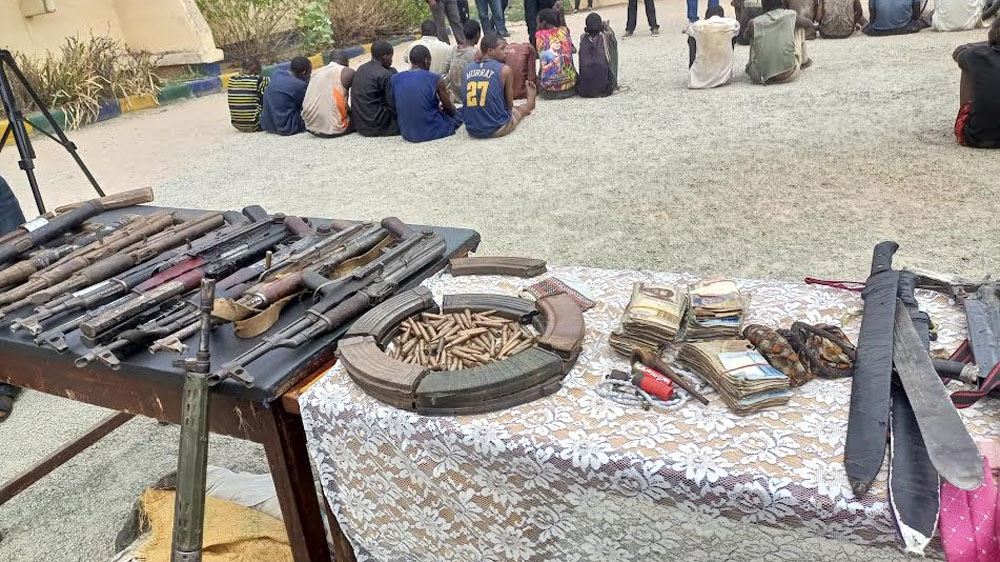metro
Kaduna, Kogi, Zamfara govts drag FG to Supreme Court over naira scarcity

Worried by the effects the Central Bank of Nigeria (CBN)’s naira redesign policy is having on the residents of their states, the governments of Kaduna, Kogi and Zamfara have dragged the Federal government before the Supreme Court, seeking a restraining order to stop the full implementation of the policy.
In a motion ex-parte filed on their behalf by their lawyer, AbdulHakeem Uthman Mustapha (SAN), the three northern states are urging the apex court to grant them an interim injunction stopping the Federal Government either by itself or acting through the CBN, the commercial banks or its agents from carrying out its plan of ending the timeframe within which the now older versions of the 200, 500 and 1000 denominations of the Naira may no longer be legal tender on February 10, 2023.
The Plaintiffs in the suit are the three Attorneys-General and Commissioners of Justice of the three states, while the Attorney-General of the Federation and Minister of Justice, Abubakar Malami (SAN), is the sole Respondent.
The Plaintiffs said that since the announcement of the new naira note policy, there has been an acute shortage in the supply of the new naira notes in Kaduna, Kogi and Zamfara States and that citizens who have dutifully deposited their old naira notes have increasingly found it difficult and sometimes next to impossible to access new naira notes to go about their daily activities.
READ ALSO:
- Tinubu most suitable to succeed Buhari, says Afenifere
- Naira redesign hardships: We’ll reconvene before elections if… – Gbajabiamila
- Man arrested for shooting his younger sister’s boyfriend in Ogun State
They also cited the inadequacy of the notice coupled with the haphazard manner in which the exercise is being carried out and the attendant hardship same is wrecking on Nigerians, which has been well acknowledged even by the Federal Government of Nigeria itself.
The Plaintiffs further maintained that the ten-day extension by the Federal Government is still insufficient to address the challenges bedeviling the policy.
Recall that over the weekend, the CBN Governor at a press conference held in Lagos insisted that that the apex bank will not extend the deadline for swapping old naira notes with the newly redesigned ones.
In the suit filed at the apex court, the Plaintiffs have also filed a motion on notice to abridge the time within which the Respondent may file and serve his Counter-Affidavit to this Suit and an order for an accelerated hearing of this matter.
The states are seeking a declaration that the Demonetization Policy of the Federation being currently carried out by the Central Bank of Nigeria under the directive of the President of the Federal Republic of Nigeria is not in compliance with the extant provisions of the Constitution of the Federal Republic of Nigeria 1999 (as amended), Central Bank of Nigeria Act, 2007 and actual laws on the subject.
They are also asking the court to make a declaration that the three-month notice given by the Federal Government of Nigeria through the Central Bank of Nigeria under the directive of the President of the Federal Republic of Nigeria, the expiration of which will render the old Banknotes inadmissible as legal tender, is in gross violation of the provisions of Section 20(3) of the Central Bank of Nigeria Act 2007 which specifies that Reasonable Notice must be given before such a policy.
The Plaintiffs are also urging the court for a declaration that given the express provisions of Section 20(3) of the Central Bank of Nigeria Act 2007, the Federal Government of Nigeria, through the Central Bank of Nigeria, has no powers to issue a timeline for the acceptance and redeeming of banknotes issued by the Bank, except as limited by Section 22(1) of the CBN Act 2007. The Central Bank shall at all times redeem its bank notes.
The Plaintiffs further want the court to direct the immediate suspension of the demonetisation of the Federal Government of Nigeria through the Central Bank of Nigeria under the directive of the President of the Federal Republic of Nigeria until it complies with the relevant provisions of the law.
READ ALSO:
- South Africa detects two imported cholera cases
- New Naira Notes: Why we didn’t dispense N6m in our vault — Sterling Bank
- One injured as hoodlums attack Adamawa gov’s wife’s convoy
In an affidavit filed in support of the suit and sworn to by the Attorney General and Commissioner for Justice, Kaduna State, Aisha Dikko, she averred that although the naira redesign policy was introduced to encourage the cashless policy of the Federal government, it is not all transactions that can be conveniently carried out through electronic means.
She maintained that several transactions still require cash in exchange for goods and services hence the need for the Federal Government to have sufficient money available in circulation for the smooth running of the economy.
Dikko also pointed out that the Federal Government has embarked on the policy within a narrow and unworkable time frame, and this has adversely affected Nigerian citizens within Kaduna, Kogi and Zamfara States as well as their Governments, especially as the newly redesigned naira notes are not available for use by the people as well as the State Governments.
“That the majority of the indigenes of the Plaintiffs’ states who reside in the rural areas have been unable to exchange or deposit their old naira notes as there are no banks in the rural areas where the majority of the population of the states reside.
“Most people in rural areas of the Plaintiffs’ states do not have bank accounts and have so far been unable to deposit their life savings which are still in the old naira notes.
“There is restiveness amongst the people in the various states because of the hardship being suffered by the people, and the situation will sooner than later degenerate into the breakdown of law and order.
“The Plaintiff State Governments cannot stand by as they are duty-bound to protect citizens in their states and prevent the breakdown of law and order.
“I know that if the Federal Government of Nigeria had given sufficient and reasonable time for the naira redesign policy, all the current hardship and loss being experienced by the Plaintiffs’ State Governments as well as people in the various states would have been avoided.
“I know that the 10-day extension by the Federal Government is still insufficient to address the challenges bedevilling the policy. I also understand that the Federal Government cannot bar Nigerians from redeeming their old naira notes at any time, even though the senior notes are no longer legal tender.
“Unless this Honourable Court intervenes, the Government and people of Kaduna, Kogi and Zamfara State will continue to go through a lot of hardship and would ultimately suffer great loss as a result of the insufficient and unreasonable time within which the Federal Government is embarking on the ongoing currency redesign policy,” she stated.
No date has been fixed for the hearing of the suit.
Channels
metro
Anambra vigilantes torture man to death over water tank theft

Anambra vigilantes torture man to death over water tank theft
A 60-year-old resident of Nza Ozubulu in the Ekwusigo Local Government Area of Anambra State, identified only as Mr. Kenneth, was reportedly tortured to death by operatives of local vigilantes hired by his younger brother.
Activist Harrison Gwamnishu shared a video on X, showing the sexagenarian with his hands tied behind him, being repeatedly beaten with cutlasses and sticks by his assailants.
Mr. Kenneth had sold a water tank in his family house to address family issues, which his younger brother disagreed with. Consequently, the brother called for the local vigilante group, who arrested and tortured Mr. Kenneth until he succumbed to his injuries.
In the video of his torture posted by Gwamnishu, Mr. Kenneth could be heard shouting “They have killed me. It is death. I am dying! What did I do?”
READ ALSO:
- Niger: Residents flee community as troops withdraw after deadly ambush
- Place arms embargo on Nigeria, IPOB tells Italy
- BDCs blame peer-to-peer Binance, others for naira fall
As his torturers took turns to beat him, voices could be heard in the background saying in Igbo language, “You stole. It is a general property,” amongst other unclear words.
Meanwhile, Gwamnishu noted that “Currently his wife and children are subjected to fear and intimidation as they have vowed to deal with them if they continue to seek justice for the death of Mr. Kenneth.”
Demanding justice for the deceased, the activist said, “Ndi Nza Ozubulu, Anambra State, stop shying away from this case and protect the deceased wife and children.”
When SaharaReporters contacted the Anambra State Police Command for confirmation of the incident and reaction, the Police Public Relations Officer in the state, SP Toochukwu Ikenga, said he was not aware of the incident.
The police spokesperson who asked the family of the deceased to reach out to him said, “There is no report like that before me, please. Can the victim’s relatives see me please.”
Anambra vigilantes torture man to death over water tank theft
metro
Niger: Residents flee community as troops withdraw after deadly ambush

Niger: Residents flee community as troops withdraw after deadly ambush
The Nigerian military has dismantled their tents and withdrawn their services from communities in Niger State following deadly attacks by bandits and terrorists.
Two officers and four soldiers lost their lives last Friday in the Allawa community in Shiroro Local Government Area of the state during an ambush by the bandits which left over eight persons dead.
The PUNCH learnt that following the withdrawal of the soldiers on Thursday, hundreds of residents, including women, children, and the elderly have started vacating their ancestral homes and, trekking several kilometres to safety.
A resident, who is privy to the development, said that they were shocked to find the soldiers dismantling their tents ahead of withdrawing their services to the communities and called on the Niger State Government to quickly intervene to avert any attack by the bandits.
According to one of the residents who spoke to the media under the condition of anonymity, the withdrawal of the soldiers came two days after a military vehicle stepped on a landmine along the Allawa-Pandogari road, resulting in the casualty of an unspecified number of soldiers.
“We woke up on Thursday morning to find the soldiers dismantling their tents in readiness to leave the community. I don’t know if you are aware that on Tuesday, a military vehicle carrying some personnel on their way to Allawa stepped on an IED. There was a heavy casualty as many soldiers lost their lives while some were injured. The injured are in the hospital. The incident happened on Allawa-pandogari road,” the resident said.
READ ALSO:
- Place arms embargo on Nigeria, IPOB tells Italy
- BDCs blame peer-to-peer Binance, others for naira fall
- MTN, Airtel, others set to increase call, data tarrif
It would be recalled that Tuesday’s incident occurred less than a week after the two officers, four soldiers, a vigilante, and a hunter lost their lives in an ambush at Roro when bandits ambushed them in Roro, Karaga, Rumace, and other farming communities.
Another resident, who gave his name as Yahuza Allawa, told the media that dozens of residents vacated their communities as early as 4 am trekking several kilometres heading towards Erena, Gwada, Kuta, or Zumba for safety.
“We are leaving our communities now and there are insufficient motorcycles and vehicles to take us out as quickly as possible. We are afraid. We left our belongings behind because we could not carry so many things. So many other people have left already
“We are moving to either Erena, Gwada, Kuta, or Zumba. And from Allawa to Erena which is the only exit road for us and it is at least 42km and we are trekking. We cannot wait to be killed by these heartless bandits and Boko Haram. This is a serious issue, please help us report this issue,” Allawa pleaded.
The residents lamented that with the withdrawal of the military personnel, they were now more vulnerable to attacks by bandits and called for immediate intervention from the state government.
Last year, no fewer than 30 officers and men lost their lives in attacks by the bandits and terrorists in Niger State. In August 2023, 20 soldiers lost their lives while others including vigilantes sustained injuries during an ambush along Zungeru-Tegina road while responding to distress calls in some communities in Wushishi LGA.
Less than 24 hours after that incident, an MI-171 NAF Helicopter was on a casualty evacuation mission when it crashed at about 1.00 pm near Chukuba Village, Shiroro. The crash was confirmed by the Nigeria Air Force authorities. An unconfirmed report, however, said that the helicopter was shot down by suspected bandits. The pilot died in the crash.
The PUNCH learnt from anonymous military sources that the military authorities complained that they could no longer bear the incessant killing of soldiers by bandits in the state.
In his reaction, the Niger State Commissioner for Homeland Security, Bello Abdullahi, a retired Brigadier General, confirmed the withdrawal of the soldiers, saying it was part of the arrangements by the military to re-strategise on the best ways to tackle insecurity.
He said, “The whole thing is about administrative arrangements by the military to re-strategise to return in full strength”.
Niger: Residents flee community as troops withdraw after deadly ambush
metro
Police arrest abductors of Taraba varsity student

Police arrest abductors of Taraba varsity student
The Taraba State police command has confirmed the arrest of 28 suspects for various crimes, including the abduction of varsity students in the state.
State Police Commissioner CP. David Iloyanomon disclosed this during a press briefing in Jalingo on Thursday. He also revealed that the command is searching for the former Chairman of Takum Local Government Area, Mr. Shiban Tikari, in connection with the 2017 murder of a member of the State House of Assembly, Mr. Hosea Ibi. Tikari is currently on the run.
Two suspects in Ibi’s murder were sentenced to life imprisonment last month for their involvement in the kidnapping and subsequent murder of the legislator. All suspects confessed that Tikari was the one who ordered the kidnapping and murder, prompting the judge to request his arrest.
 Iloyanomon disclosed that the command has also recovered a large cache of arms and ammunition, as well as a tricycle, charms, 102 cows, a motorcycle, and other items.
Iloyanomon disclosed that the command has also recovered a large cache of arms and ammunition, as well as a tricycle, charms, 102 cows, a motorcycle, and other items.
He said, “There is no doubt that the Police Command, leveraging the support and cooperation of security agencies in the state and the good people of Taraba State, have worked assiduously to fight head-on all forms of criminality with remarkable achievements. Some of them are presented below.”
READ ALSO:
- Elon Musk is $9.8 billion richer in 1 day, despite Tesla’s revenue decline
- BREAKING: Panic at Lagos airport after fire outbreak, flights diverted
- UK University offers £37k scholarships, flight allowances to Nigerians, others
The commissioner then proceeded to detail some of the arrests made, including:
- Abdulkarim Ibrahim: Arrested in Perogal Tunga village, Sardauna LGA, for terrorizing villages in the local government. He confessed to involvement in several kidnappings.
- Garba Yahaya and Abdullahi Usman Mohammed: Arrested in Gassol LGA for their involvement in a series of kidnappings and collecting ransom money.
- Laulo Alhaji Adamu: A notorious kidnapper arrested in Bamanda Village, Lau LGA, for terrorizing Jimlari and Marraraban Kunini villages. He has confessed to several kidnappings.
Other criminal suspects were arrested for various crimes, including culpable homicide, armed robbery, illegal possession of arms, cyber crimes, banditry, criminal conspiracy, theft, and cattle rustling.
Iloyanomon also highlighted an incident where officers of the command turned down a bribe of ₦8,000,000 while on patrol. The Inspector General of Police commended these officers for their professionalism and urged others to emulate them.
The commissioner concluded by thanking the Governor of Taraba State for his commitment to combating crime and supporting security agencies in ensuring peace and security in the state. He reaffirmed the Taraba State Police Command’s commitment to upholding law and order.
Police arrest abductors of Taraba varsity student
-

 Education5 days ago
Education5 days agoWhy we charge N42m fees for primary school pupils — Charterhouse Lagos
-

 Auto5 days ago
Auto5 days agoWe expect massive roll-outs of Nigeria-made cars by December 2024 – Minister
-

 metro5 days ago
metro5 days agoJUST IN : Borrow pit collapses, kills seven Qur’anic school pupils
-

 News5 days ago
News5 days agoWe’re not part of Yoruba Nation agitation, says MKO Abiola family
-

 metro4 days ago
metro4 days agoHow gunmen killed Babcock university lecturer, abducted two – Police
-

 Politics5 days ago
Politics5 days agoOndo APC primary: Ododo, gov aspirant in open confrontation
-

 metro7 days ago
metro7 days agoEdo commissioner accused of disrespect loses chieftaincy title
-

 News7 days ago
News7 days agoIGP orders withdrawal of police attached to Yahaya Bello




















